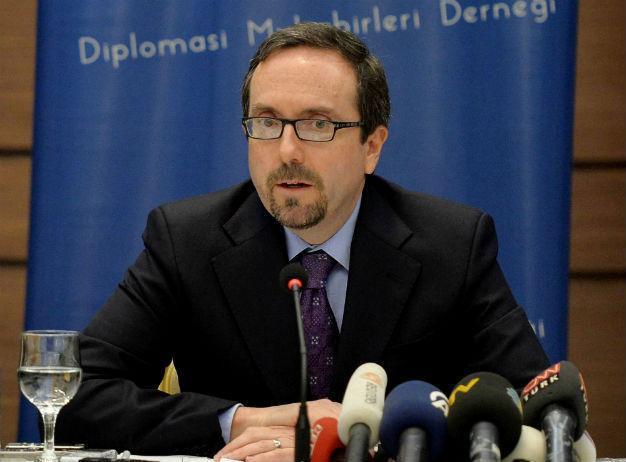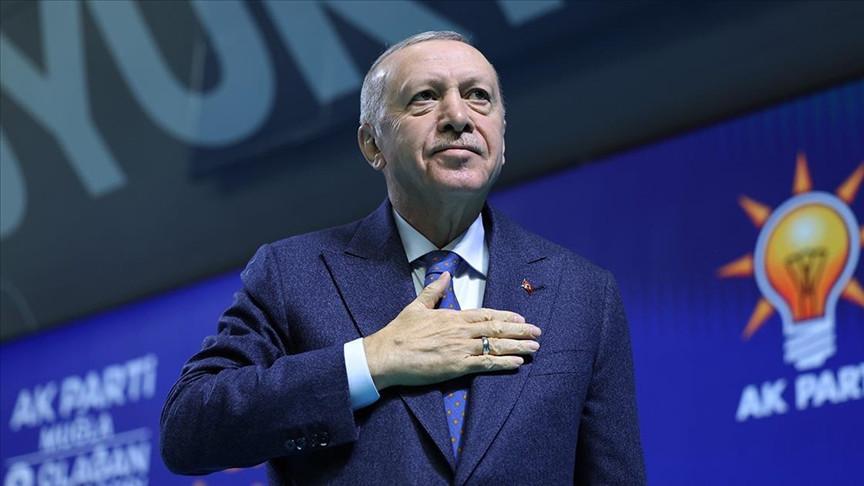Top US diplomat in Turkey calls on PKK to lay down arms
Emine Kart - ANKARA

AFP photo
The United States’ top diplomat has called on militants of the outlawed Kurdistan Workers’ Party (PKK) to lay down their arms, while recognizing the legitimacy of the Turkish government’s security operations due to “terrorist attacks and declarations of autonomy” by the PKK.U.S. Ambassador John Bass, speaking with members of the Diplomacy Correspondents’ Association (DMD) on April 7, also emphasized that any possible return to “a peace process” with the PKK could only be possible if the PKK ends violence and would be solely up to “the citizens of this country.”
“Our hearts continue to go out to all citizens of this country who are suffering as a result of the terrorist attacks and violence which continues to occur here. The United States remains strongly committed to working together with the government of this country and the people of this country to combat terrorism,” he said.
“And we continue to reject the use of violence to try to achieve political objectives and as we have so many times and as we will continue to do after today, we call again on the PKK to stop its campaign of violence and to put down its weapons and to undertake a legitimate conversation to the extent there are opportunities to do so, in a manner in which the citizens of this country conclude as acceptable, to talk about the underlying problems or grievances which have contributed to the violence,” Bass said in introductory remarks at the meeting.
Bass was reminded of Turkish President Recep Tayyip Erdoğan’s recent remarks in which he dismissed any prospect of further “negotiations” with the PKK and was asked whether the U.S. side had encouraged Erdoğan to restart the peace process “which he said has been in the refrigerator.”
“First, the United States strongly supports the Turkish government’s right to protect its population and the citizens of this country against all terrorist threats and against violence perpetrated against its citizens, that is the basic responsibility of any government and we see the effort to address the PKK violence very much in that line. I have been very disturbed by the level of violence in urban environments in southeast Turkey but I think it is important to remember why that violence is occurring. It is occurring because the PKK has chosen to pursue terrorist attacks and declarations of autonomy for political areas inside of [their] environments that are completely inappropriate, so it is natural for a central government to take measures against a terrorist threat whether it is happening in a rural area or urban area. Having said that, we believe it is important and I would say we have learned this lesson through very painful experience for counterterrorism operations to be as precise as possible and to be conducted in a way that to the greatest extent as possible minimizes civilian casualties. This is one of the reasons why we are so careful in many of our operations against Daesh and in part why it is perhaps taking longer to have the effects we wanted to see in the areas that Daesh controls because we are being very, very careful about any civilian casualties that might come from our military action against Daesh,” Bass said, using an Arabic acronym for the Islamic State of Iraq and the Levant (ISIL).
“It is a very challenging problem, there is no question about it. Those of us who are guests and diplomats in this country can feel the pain and the suffering that is created by all this violence. That is why I think it is so important for the PKK to stop its violent attacks, its terrorist attacks and to enable the start of a process that ends up once again with the citizens of this country determining the best way to address the underlying issues that have prompted the violence in the first place. And in that context, let me just emphasize, the solution to this violence, the way in which this society addresses this violence, as well as the underlying issues, is a matter for Turkish citizens to decide. It has to be a solution that comes from within this society,” Bass added.
Right mix
Bass’ gathering with Turkish reporters came days after diplomats, soldiers and intelligence officers from both Turkey and the U.S. met in Ankara on April 4 following a meeting of Erdoğan and U.S. President Barack Obama in Washington to discuss the future phases of the joint fight against jihadists in Syria and Iraq and find a formula over the role of the military wing of the Democratic Union Party (PYD) in plans to re-take the Manbij region.
“We have worked very closely with our Turkish colleagues in the Turkish government for many months to determine the best way to ensure that the local Syrian forces can push Daesh out of areas that they have previously controlled or currently control and remain in those areas to provide appropriate levels of security and basic governance after Daesh departs so that the aftermath of the conflict to push Daesh out does not result in an additional population of refugees or internally displaced people within Syria,” Bass said.
“We continue to work very closely together to make sure we have the right forces that we can work with together to clear that area and that we will have the right mix of people that Syrians preferably from those communities who can return to them to provide security and administration after Daesh is cleared out. We don’t want one problem replaced with another problem,” he also said, without openly commenting on an exclusive report by Hürriyet’s Tolga Tanış which said Erdoğan demanded that the Syrian Arab tribes to be included in the Manbij operation leave the Syrian Democratic Forces (SDF), which is under the control of the PYD, and undergo “background checks.”
“We have an ongoing discussion between our governments about a range of terrorist organizations including the PKK. A few months ago, the Turkish government brought to our attention an incident in which they recovered U.S.-made weapons from some of the militants in the southeast that they arrested. We were able to verify that those weapons were from the stocks that we provided to Iraqi security forces. I think that was helpful information to the Turkish government,” Bass said.
No weapons, ammunition to YPG
“We have been very clear with any of the groups that we have worked within any fashion in Syria that we are only working them with a limited focus on our efforts against Daesh. And any support we have provided to Syrian groups has been provided with the expressed purpose of anti-Daesh operations. And I would just reiterate again, since there is still speculation, the United States is not arming the YPG [People’s Protection Units, the PYD’s militia force]. We are not providing arms and ammunition to the YPG,” Bass said.
İncirlik air base still important
“I think it is important to put that in the context of the ongoing military operations against Daesh that are happening from that area and to understand that it was very unusual for us to have family members out of a facility that is actively engaged in military operations and particularly a one that was so close to the what we call ‘theater of operations’ – where those military actions are actually taking place,” Bass said, when commenting on the Pentagon and U.S. State Department’s order for families of U.S. troops and civilian personnel stationed at İncirlik Air Base in Adana as well as from İzmir, Muğla and Adana, to withdraw from Turkey.
“Incirlik and other [facilities] from which we conduct military cooperation remain an important contributor and an important element with the end the broader coalition to defeat Daesh,” Bass said, denying certain commentaries to the contrary in the U.S. media. “I expect it will continue to be as long as the Turkish government continues to welcome our operations from the base. Over the last six months, an increasing number of countries operating from İncirlik and that alone indicates the value the coalition members see.”
‘Hypocrisy’
The envoy also expressed his surprise that some Turkish media reports labeled Obama’s remarks on press freedom in Turkey as “hypocrisy,” as they came right after his meeting with Erdoğan.
“I’m going to let President Obama’s remarks speak for themselves. I would say they reflect what we have been discussing on many different occasions between two government who are friends in private as well as public. And I think what we’ve said previously whether it was as the vice president during his recent visit whether it is what you heard from the spokespersons of the State Department and the White House, it has been very consistent,” Bass said.
“I have to say I have been struck by some of the coverage of this issue here in terms of suggesting that there is a degree of hypocrisy in the approach taken by the U.S. officials. And I think it reflects, as I try to understand where that line of argument comes from, I think it reflects perhaps a lack of appreciation for the differences in our legal systems when it comes to the advocation of freedom of speech,” he said.
“The United States does not have a law at our national level against defamation, against speech. So there is no criminal process in the United States at the national level for statements that are insulting. And if you look at for example at President Obama’s Instagram feed on a daily basis, you’ll see quite a bit of commentary that qualifies that is pretty insulting. I don’t like it; I find it insulting. I find some of what is posted on my Instagram feed or the Embassy’s Instagram feed as insulting. And I certainly don’t agree with it, but we tolerate it because for us, freedom of speech and freedom of the press, those are two of the most important foundations to our constitutional democracy. Now, our friends in Europe, including in Turkey, have taken a bit of different approach to this issue in terms of having defamation laws. And that is a matter for the citizens in each of those countries to determine whether or not that is an appropriate balance for them and their societies in terms of how they balance speech freedoms against personal privacy and other aspects of their legal system. I am not going to say that our system is better; I would just say that it is different and I think it is important for your leaders and citizens of this country that they understand that when they see us approaching things differently it is because we have a different legal tradition that underpins our approach to the issue,” Bass said.
Gülen adherents
“With respect to the activities of [U.S.-based Islamic scholar Fethullah] Gülen and his organization, we are always entrusted and receiving information regarding actual or possible criminal activity in the United States. We always take that seriously whether it is comes from Turkey or Germany or another partner’s law enforcement organizations. We evaluate it very closely in the context of U.S. law. There have been a couple of instances recently where adherents of Mr. Gülen were found to have violated U.S. campaign laws. Those cases are before the Federal Election Commission for adjudication at this time,” Bass said when asked whether Turkish officials had shared any intelligence and whether there is an ongoing judicial cooperation against the network of Gülen.
The Turkish administration has accused Gülen of running a “parallel” state and of plotting to overthrow the president and the government.
















